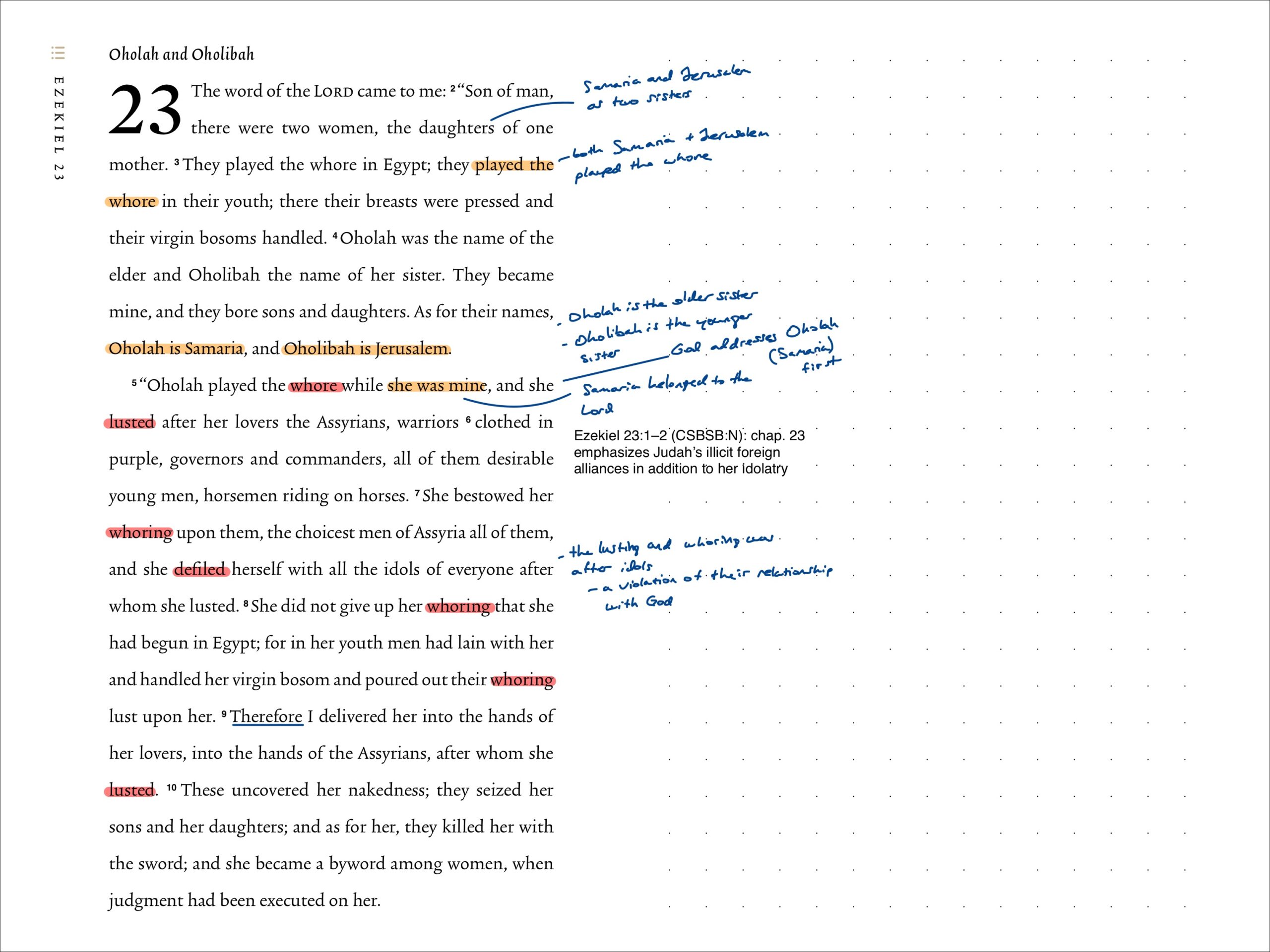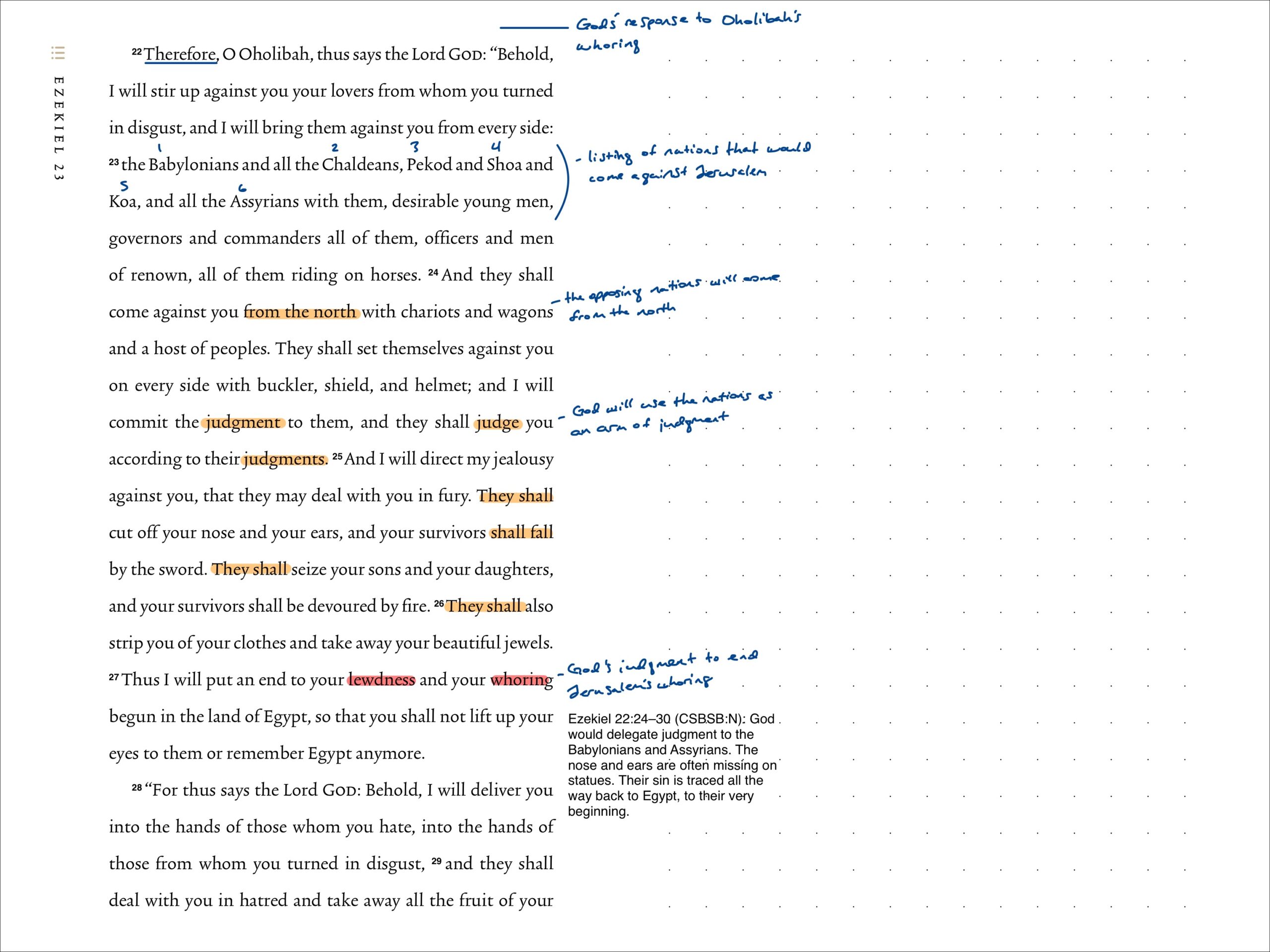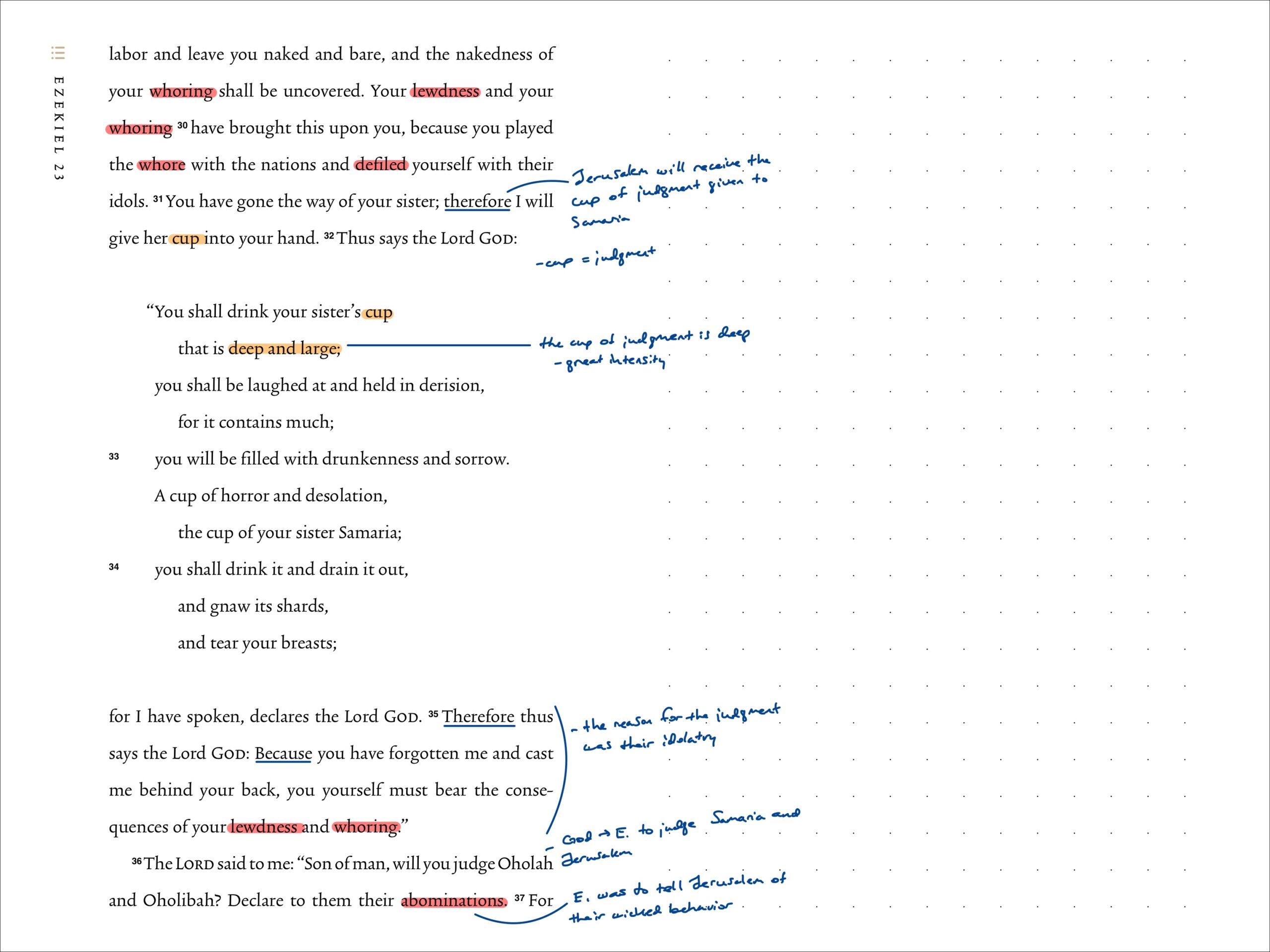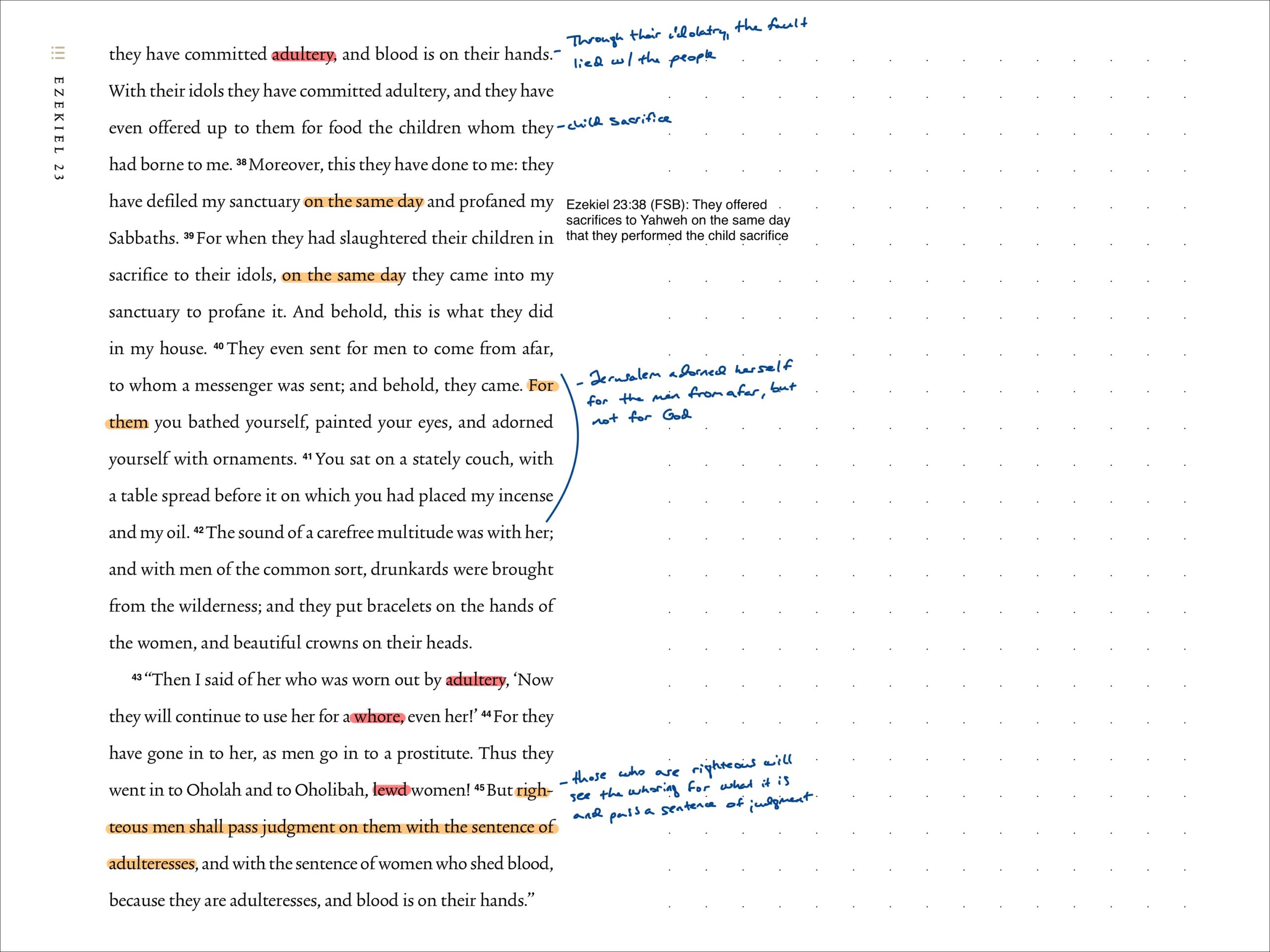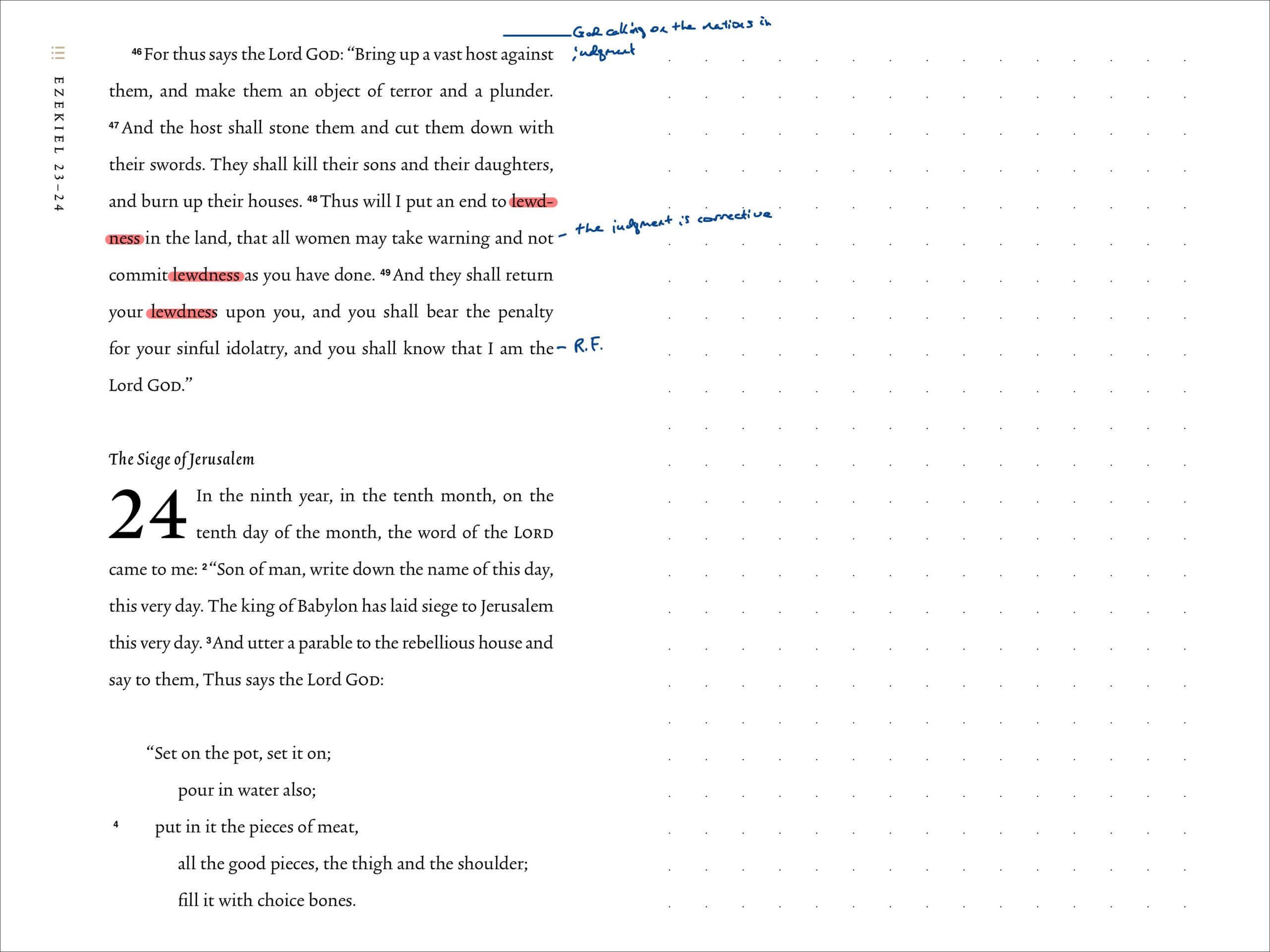| Date | Version | Reading Plan |
|---|---|---|
| @September 13, 2023 | ESV (2016) | ESV Prophets Plan 2023 |
Pericopes
- Oholah and Oholibah
Notes
The chapter opens with a word that came to Ezekiel from God about “the daughters of one mother”: Oholah (Samaria) and Oholibah (Jerusalem). Oholah was the elder sister and Oholibah was the younger sister.
In Ezek. 23:5-10, God address Oholah first as one who “played the whore” when she belonged to God. She lusted after “her lovers the Assyrians” and thus was abandoned by God. Left vulnerable apart from God’s presence, her enemies uncovered her nakedness and slew her with the sword (Ezek. 23:10).
In Ezek. 23:11-21, God then turns to address Oholibah (Jerusalem) who saw her sister’s lewd behavior and became even worse (Ezek. 23:11). Rather than embracing her God-given mission to bring the message of salvation to the nations (Gen. 12:1-3), as a prostitute Jerusalem used the nations for her own advantage. God turned from her in disgust as she flaunted her nakedness in the same way He did with her sister (Ezek. 23:18). Not only did she not repent, she actually “increased her whoring”, remembering her days of youth as a whore in Egypt (Ezek. 23:19).
In Ezek. 23:22-28, God responds to Oholibah’s whoring by stirring up her lovers whom she had turned away, the Babylonians. God lists the nations and tribes that He will bring against them: 1) Babylonians, 2) Chaldeans, 3) Pekod, 4) Shoa, 5) Koa, 6) Assyrians (Ezek. 23:23). This is fulfilled in Zedekiah’s rebellion against Babylon which leads to the destruction of Jerusalem and the temple in 586 BC.
In Ezek. 23:28-35, God continues in His pronouncement of judgment on Oholibah, that those whom she turned away in disgust will take away all the fruit of her labor, leaving her naked and bare (Ezek. 23:29). Jerusalem will receive the cup of judgment that God had given to her sister, Samaria (Ezek. 23:32). The “cup” in the Bible is a neutral metaphor, but is most frequently used to refer to a toxic or intoxicating drink (Ps. 75:8; Jer. 25:15–16; Lam. 4:21; Hab. 2:15–16) or as a cup of judgment or wrath (Isaiah 51:17; Jer. 51:7; Rev. 17:3–4; Rev. 18:6). The cup here God describes as “deep and large”, insinuating a wrath of profound intensity.
In Ezek. 23:36-42, God rhetorically asks Ezekiel to judge Oholah and Oholibah by declaring their abominations, advising them of both charge and verdict. Through their idolatry, the fault lied with them and “blood is on their hands” (Ezek. 23:37). They violated God’s sanctuary by offering sacrifices to Him on the same day that they performed child sacrifice (Ezek. 23-39). Jerusalem played the whore and adorned herself for the men who had “come from afar” (Ezek. 23:40).
In Ezek. 23:43-45, God spoke to the lewdness of Jerusalem and of how they had gone into her, “as men go in to a prostitute.” But then He says that the righteous who see her whoring will pass a sentence of judgment on her as is done with adulteresses with the blood being on their hands (Ezek. 23:45).
The remaining verses (Ezek. 23:46-49) is God’s calling on the nations in judgment, to make Jerusalem “an object of terror and a plunder”. God’s aim is corrective as He will put an end to lewdness in the land so that “all women will take warning”, preventing such conduct in the future (Ezek. 23:48), even though still bearing the penalty for their behavior. All of this in order that they shall know that He is the Lord God (Ezek. 23:49).
Application
In this chapter, Samaria (capital of Israel in the north) and Jerusalem (capital of Judah in the south) are depicted as two sisters, Oholah and Oholibah. Oholah, the older sister, “played the whore” and lusted after her idols, but when Oholibah (Jerusalem) saw this, she became even more corrupt than her sister. The vast majority of the chapter is devoted to the younger sister, Jerusalem, and of God’s corrective judgment on her.
As I read this, I think about the influences I’ve had over the years. When I was a kid, I was pretty impressionable and rambunctious, which often led to times where I would play along with the devious hatchings of my friends. These activities rarely ended well, typically resulting in injury, destruction of property and the like. And when the hammer came down from my parents, it was never for the neighborhood kids. I was always the one who received the brunt of it. My parents’ focus was not on them because they were not their children. I was.
We see something similar in this chapter. God focused on Jerusalem because the nation of Judah was the one He had chosen to bless and from whom would come the Messiah. It is always the children of God who get the strongest chiding because it is to Him they belong. As a Father who loves His children, God redeems wayward hearts through resolute correction, often through difficult circumstances. We are called to face such seasons with joy (James 1:2), knowing that they are to build within us a stronger reliance on and deeper relationship with Himself.
Scripture Journal Notes
Commentaries & Resources Used
- ESV Study Bible. (Wheaton, IL: Crossway, 2008)
- Faithlife Study Bible (Lexham Press, 2016)
- Believer’s Bible Commentary (Thomas Nelson, 2016)
- CSB Study Bible Notes (Holman Bible Publishers, 2017)
- Matthew Henry’s Commentary on the Whole Bible (Guardian Press, 1976)
- The Bible: A Reader’s Guide (Sterling Publishing, 2011)
- The Infographic Bible (Zondervan, 2018)
- ESV Digital Scripture Journal (Crossway, 2019)
